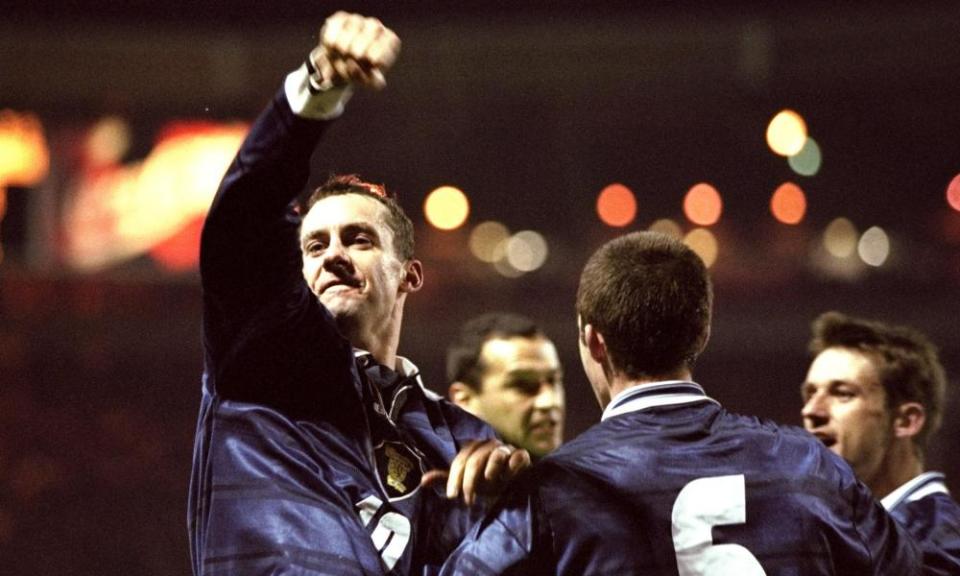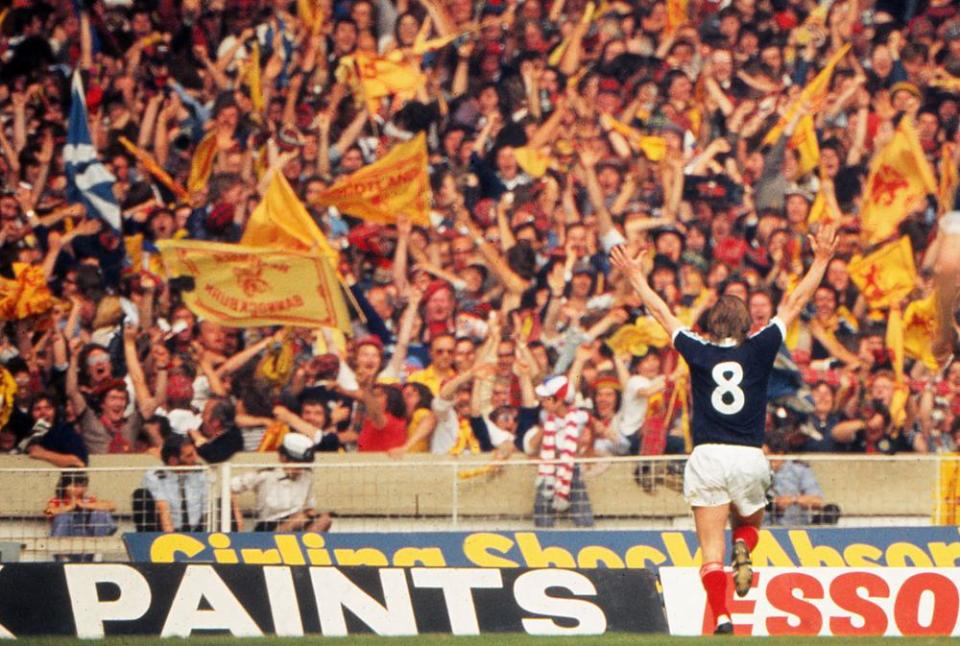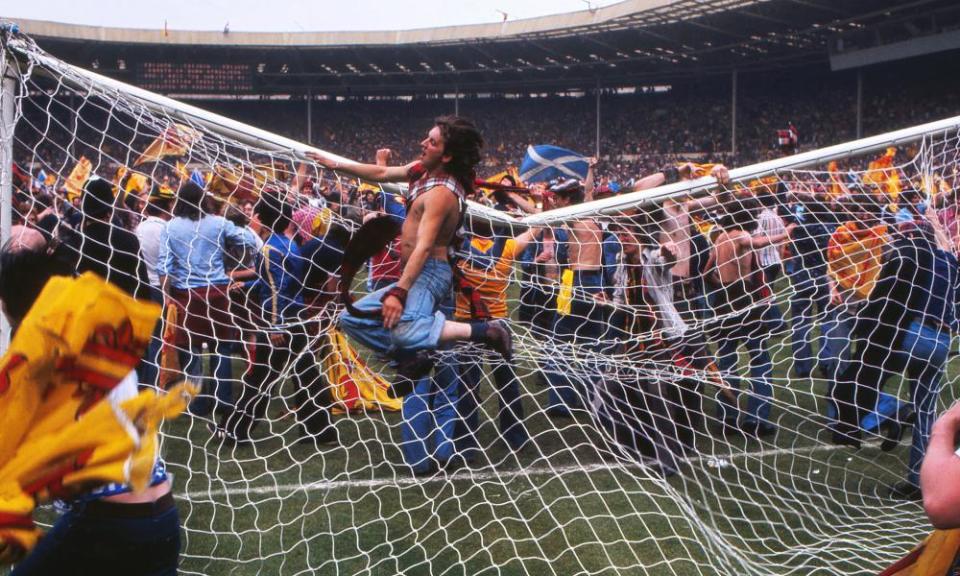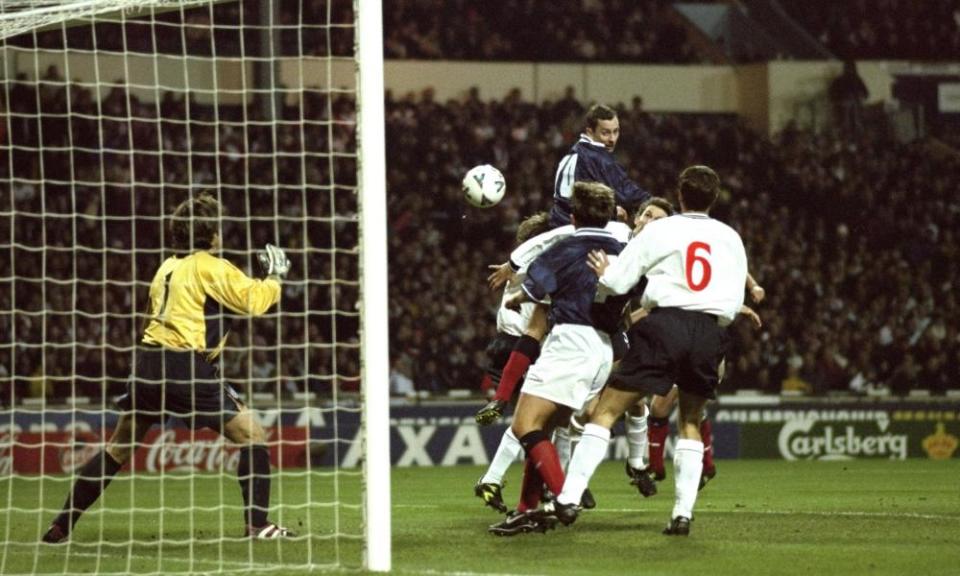‘We had personality’: when Scotland won at Wembley in 1999 but still lost

It was the epitome of glorious failure. The last time Scotland won a competitive fixture at Wembley their efforts were essentially in vain. A 2-0 victory for England at Hampden Park days earlier meant Scotland’s single-goal success on 17 November 1999 ensured only an aggregate defeat. It was Kevin Keegan’s men who took the place at Euro 2000.
This was, however, an outstanding Scotland display. As Neil McCann stood up a cross, seven minutes before half-time, Don Hutchison arrived to bundle a header beyond David Seaman. Hutchison can talk through the goal as if it happened yesterday. “Christian Dailly played a perfect pass to Neil,” he says. “I got the flight of the ball almost as soon as it left Neil’s boot. Rather than rushing in, I stood still, then made sure I got the jump on Tony Adams. Billy Dodds actually tried to nick the goal from me.”
Related: Jack Grealish is perfect for Scotland game with England seeking Gascoigne moment | Karen Carney
Hutchison’s abiding memory from that evening does not involve his goal or the wild celebrations that followed it. “My dad was a miner, 6ft 4in, hard as nails,” Hutchison says. “Somehow he blagged his way down to the tunnel after the game. I shook his hand and he held on for an extra few seconds. He had a tear in his eye and tried to brush it off as pollen or something. I knew he was emotional and he never got emotional.”
Craig Burley, part of the Scotland midfield that night, does not focus on Hutchison’s marquee moment either. “David Seaman’s point-blank save from Christian Dailly,” Burley says. “Christian came flying in like a train for the header; either side of Seaman and it’s in the net. My thinking now is the same as then: we had England on the rack for most of that game and if we had got the second goal, we would probably have done it.
“The Scotland camp, particularly Craig Brown and [assistant manager] Alex Miller, were convinced that if we did something different, Kevin Keegan wasn’t particularly good at adapting. We had been a rigid 3-5-2 for years, never changed. We went to 3-4-3, not a massive change but still a change. Craig thought that would flummox England and to an extent it did.”

This was, though, a story of what might have been. Historical Scotland successes at Wembley are more regular than might be expected given the population gulf. Scots of a certain vintage still insist their team were unofficial world champions after the 3-2 win in north London in 1967 that included Jim Baxter taunting the hosts with keepie-uppies. In 1977 Tartan Army celebrations – turf, goalposts and all– became the stuff of legend but also emphasised how much this fixture means to a country which finds itself in bed with an elephant. Scotland fans will be pained by constant reruns this week of that Paul Gascoigne goal at Euro 96.

Burley and Hutchison agree it would be wrong to portray England players as caring less about a rivalry that stretches back to 1872. “In our heads we always thought it mattered more to us but I’m not convinced by that now,” says Burley. “Having spent 25-plus years in England, I know how much they want to beat us.” Burley recalls the intensity of the England camp around those 1999 ties, illustrated by a pre-match encounter with Dennis Wise. “I was his teammate at Chelsea for 10 years,” Burley recalls. “I walked past him in the tunnel and asked if he was involved. ‘Can’t tell you.’ I was like: ‘What?!’ They were worried.”
In what should presumably apply to Kieran Tierney, John McGinn, Andy Robertson and others this week, Burley points out the regularity with which he and, for example, John Collins faced David Beckham, Paul Scholes and Alan Shearer in domestic football. There was no inferiority complex when Scotland shirts were donned. “We weren’t afraid of anyone,” Hutchison says. “Maybe now some players are put on more of a pedestal. We had personality and character and fancied our chances. We had to take the lead, which is exactly the same as Scotland this week. That has to be the mindset.”
Hutchison, delayed by the endearing encounter with his father, walked into a silent dressing room where players had heads in hands. Eventually, discussion began about how well Scotland had played. “The voices started about how positive it was to go to Wembley and beat England,” says Hutchison. “We went out with a lot of pride.”

Burley, on a walk towards the press lounge, was involved in a conversation that still resonates in respect of how Scotland supporters view the England team and all the expectation – which routinely transmits as arrogance - around it. Burley says: “I bumped into an English journalist who told me: ‘I’ve just listened to Kevin Keegan talking about winning the Euros. We have just been battered by Scotland at Wembley.’” England did not emerge from the group stage at Euro 2000.
Burley and Hutchison will be involved in television work for ESPN in the United States as Steve Clarke becomes the latest Scotland manager to try to crack the Wembley code. More than 3,000 miles away, Burley will roar on his country and Gateshead-born Hutchison will do the same in respect of his adopted one. A 2-0 loss to the Czech Republic means Scotland are not quite desperate for at least a draw but would dearly love such an outcome.
“The Czech game wasn’t the worst Scottish performance I’ve seen, by a long stretch,” Burley says. “I played in worse. But ultimately Scotland struggle with a bit of quality in the final third so I think Stevie has to find something different there. If you just go and take England on head to head? They’re going to win.”
In November of 2016, Scotland barely laid a glove on England when falling to a 3-0 defeat at Wembley. Seventeen years earlier has to be the reference point for Clarke, even if the consequence of narrow victory felt so typically Scottish.

 Yahoo Sport
Yahoo Sport 





































